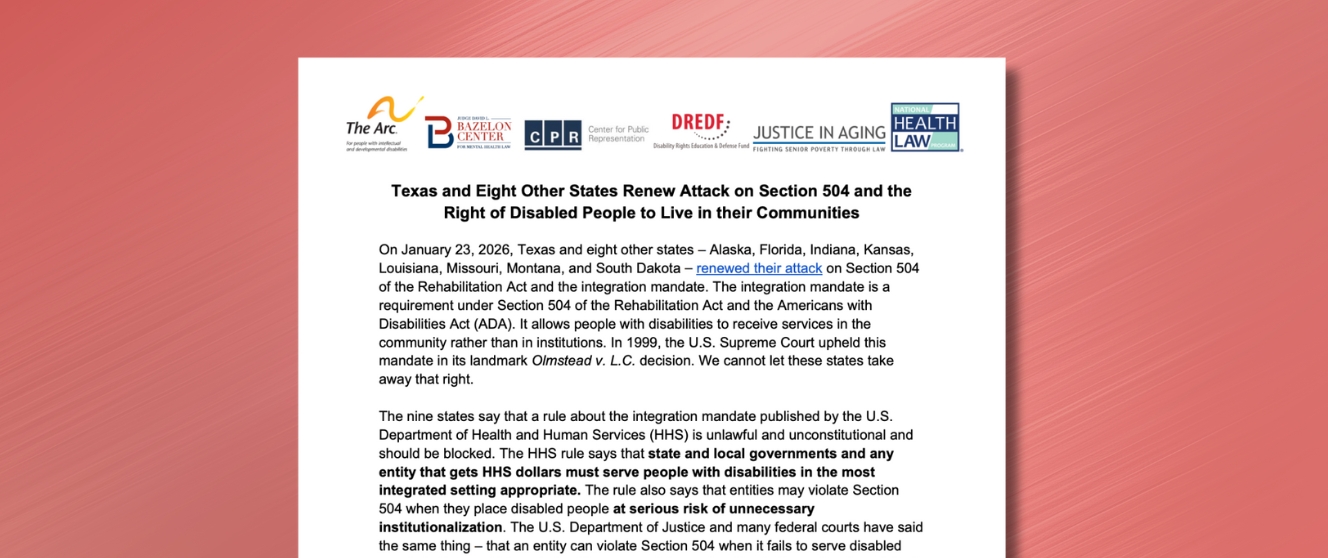
January 7, 2022
Submitted via Email
The Honorable Xavier Becerra, Secretary
U.S. Department of Health and Human Services
The Honorable Janet Yellen, Secretary
U.S. Department of the Treasury
The Honorable Chiquita Brooks-LaSure, Administrator
Centers for Medicare & Medicaid Services
RE: DREDF Comments on Georgia’s Section 1332 Waiver
Dear Secretary Becerra, Secretary Yellen, and Administrator Brooks-LaSure:
The Disability Rights Education and Defense Fund (“DREDF”) appreciates the opportunity to provide comment on Georgia’s approved Section 1332 Waiver, which permits the State to exit HealthCare.gov—a central source of enrollment and enrollment assistance for the roughly 500,000 Georgians who enroll in private health plans or Medicaid through the platform. DREDF has serious concerns that this waiver does not meet the requirements of Section 1332 of the Affordable Care Act (“ACA”) and its 2023 implementation will have a devastating impact on access to health care for and health outcomes experienced by Georgians with disabilities.
DREDF is a national cross-disability law and policy center that protects and advances the civil and human rights of people with disabilities through legal advocacy, training, education, and development of legislation and public policy. We are committed to increasing accessible and equally effective healthcare for people with disabilities and eliminating persistent health disparities that affect the length and quality of their lives. DREDF’s work is based on the knowledge that people with disabilities of varying racial and ethnic backgrounds, ages, genders, and sexual orientations are fully capable of achieving self-sufficiency and contributing to their communities with access to needed services and supports and the reasonable accommodations and modifications enshrined in U.S. law. In particular, DREDF has significant experience in ACA and Medicaid law and policy, given that disabled individuals disproportionately live in poverty and use health care services and devices to support their full lives. Medicaid is by far the largest publicly-funded provider of long-term services and supports, and thus is a very significant or sole source of essential health care for many people with disabilities.
DREDF unequivocally opposes the approved Georgia Section 1332 Waiver, which permits Georgia to withdraw from HealthCare.gov in 2023 and decentralize its healthcare enrollment into a system that forces consumers to search among a multitude of private, profit-drive web brokers and insurers in order to find health coverage. This chaotic and fragmented system will create new barriers to health care enrollment for hundreds of thousands of people, and it will result in the unknowing enrollment in “junk” plans that do not meet an individual’s needs.[1] These large health coverage losses would undermine the express purposes of the ACA. Under Section 1332, which only permits the HHS and USDT Secretaries to approve waivers that will ensure as comparable of enrollment, affordability, and comprehensiveness of coverage as without the waiver, the approval cannot stand. We urge you to rescind the waiver in order to avoid the harms that the program changes will inflict on the residents of Georgia.
I. Georgia’s Waiver Will Reduce Overall Health Care Enrollment and Steer Consumers to “Junk” Plans That Do Not Meet Their Needs
Georgia’s Section 1332 Waiver will change where and how consumers purchase health insurance coverage. In 2020, the vast majority (79 percent) of Georgia marketplace enrollees used HealthCare.gov to sign up for coverage, even though they already had the option to use a private broker or insurer website. Georgia’s waiver will eliminate the one-stop shop of HealthCare.gov, requiring people in the state to use private insurance companies and brokers to compare plans, apply for financial assistance, and enroll in coverage. This will undoubtedly increase confusion about where and how to access high-quality health coverage, hindering enrollment and prompting many people to give up and become uninsured. Contrary to the promise of expanded choices, this waiver would rob consumers of their only option for a guaranteed, central source of unbiased information on the comprehensive coverage available to them.
Moreover, private brokers and insurers who operate through HealthCare.gov have a track record of failing to alert consumers of Medicaid eligibility and picking and choosing the plans they offer, often based on the size of plan commissions.[2] Indeed, in Georgia’s new system, people who are eligible for Medicaid could have a much harder time finding help with enrollment because Medicaid generally does not pay commissions, and agents and brokers have no incentive to fill the gap left for this population that would result from eliminating HealthCare.gov.
Georgia’s waiver allows substandard plans, such as short-term plans, to be presented alongside comprehensive insurance. Even now, brokers sometimes steer people into such plans, which often come with higher commissions—a tactic that has continued even during the pandemic.[3] People enrolled in subpar or “junk” plans are not protected by the ACA’s provisions, instead being subject to punitive exclusions of their pre-existing conditions, benefit limitations, and caps on plan reimbursements that expose them to potentially high out-of-pocket costs. A study of short-term plans in Atlanta earlier this year showed that even though people would pay lower premiums up-front, they could be responsible for out-of-pocket costs several times higher for common or serious conditions, such as diabetes or a heart attack. The most popular plan in Atlanta refused to cover prescription drugs, mental health services, or maternity services, had pre-existing condition exclusions, and had a deductible three times as high as an ACA-compliant plan. [4]
II. Georgia’s Waiver Will Have a Disproportionately Negative Impact on People with Disabilities
The implementation of Georgia’s Section 1332 Waiver will have a particularly devastating impact on health consumers with disabilities. HealthCare.gov is not only a centralized hub of health insurance plans, but it also offers critical information and assistance to consumers who need help choosing the right health plan for them. In particular, HealthCare.gov provides free “navigators” or assisters to people seeking access to coverage. The navigator program received a $70 million funding increase in 2021, making it more robust than ever. Assisters are more likely than agents and brokers to help with Medicaid or CHIP enrollment, perform public education and outreach activities, and to help people with disabilities, people who have limited English proficiency, or people who lack internet at home in finding and enrolling in health coverage. Georgia has opted out of this federal investment and has not established any alternative for impartial, unbiased help. In fact, the State made it illegal to use state funds on navigators. This means that vulnerable, uninsured people will be less likely to find coverage.
Without a central platform to explore plan options, and without navigators, Georgians with disabilities will have a more difficult time finding a plan that meets their unique needs—a problem that will have a ripple effect on the livelihoods of people who cannot find or who unknowingly enroll in a limited coverage plan because of Georgia’s new system. Health care services and supports are crucial to ensuring that people with disabilities can maintain employment, pursue education, raise their families, and participate in their communities. Benefits as simple as a wheelchair, physical therapy, prescription medications, cognitive behavioral therapy, or an accurate glucose monitor are essential to ensuring that people with chronic conditions and disabilities can live and function independently. Without sufficient access to these benefits, or enrollment in a the health plan that covers them, many individuals will be denied equal access to society.
Take, for example, coverage of mobility devices such as a wheelchair. For people with mobility disabilities, access to a working and properly fitted wheelchair can be a gateway to full participation in their communities. Without health insurance coverage of appropriate equipment, people are often homebound—unable to work, go to school, or even get out of bed. Others may be forced to obtain lesser devices than what they medically need, putting their health and safety at risk. Still others face institutionalization because they cannot function in their own homes.
Georgia’s Section 1332 Waiver will make it exceedingly more difficult for people with disabilities to find a health plan that covers the particular health care services and devices that they need, and it will increase the likelihood that they mistakenly enroll in a health plan that does not even meet the basic requirements of the ACA. The ACA’s provisions on comprehensiveness of coverage and prohibitions on pre-existing condition exclusions, for example, would not apply to certain plans that private brokers may steer health consumers towards. This dangerous potential is not what Congress intended in enacting the ACA, and a State “Innovation” Waiver that attempts to implement this unjust framework cannot stand under the law.
III. Georgia’s Waiver Violates the ACA’s Statutory Requirements
Section 1332(b)(1) of the ACA only permits the Secretaries to grant a State Innovation Waiver when that waiver “will provide coverage that is at least as comprehensive as the coverage defined in [the ACA’s essential health benefit provisions]”; will provide coverage and ensure cost-sharing is “at least as affordable” as without the waiver; and “will provide coverage to at least as comparable number of its residents” as without the waiver. 42 U.S.C. § 18052(b)(1). Here, Georgia’s waiver will make coverage less comprehensive, exposing individuals to non-ACA compliant “junk” plans; it will make coverage less affordable and increase out-of-pocket costs for many consumers; and its decentralized, navigator-less system will decrease overall enrollment numbers.[5]
The ACA’s Section 1332 Waiver was intended to allow room for state experimentation—innovation that was intended to push the upward bounds of enrollment and further increase comprehensiveness of coverage. It was not intended to allow States to circumvent the ACA’s requirements and slide back to pre-ACA fragmented processes.
Georgia’s waiver not only fails to meet Section 1332’s mandatory guardrails, but it flagrantly contravenes the purposes of the ACA. Under any reasonable legal analysis, it cannot stand. The waiver should be revoked immediately.
IV. Georgia Has Better Options to Address the Waiver’s Purported Goals
Not only does Georgia’s Section 1332 Waiver fail to meet the ACA’s requirements, but there is a simpler solution to its purported goals, endorsed by the ACA itself: Medicaid expansion. Expanding Georgia’s Medicaid program has the potential to provide health care coverage to hundreds of thousands of uninsured individuals and families. This expansion would result in significant benefits to Georgia’s residents, including improved access to care (including the long-term services and supports that people with disabilities and chronic conditions need to live full lives), fewer premature deaths, and increased financial security for people gaining coverage.[6] Georgia should consider this solution—already adopted by 39 other States and the District of Columbia—rather than upending its insurance market at great risk to its residents.
Thank you for considering our comments. Please do not hesitate to contact us should you have any questions.
Sincerely,
Carly A. Myers
Staff Attorney
Disability Rights Education & Defense Fund
[1] Tara Straw & Jason Levitis, Georgia’s Plan to Exit Marketplace Will Leave More People Uninsured, Should Be Revoked, Center on Budget & Policy Priorities (Dec. 17, 2021), https://www.cbpp.org/sites/default/files/12-17-21health.pdf; Tara Straw, Tens of Thousands Could Lose Coverage Under Georgia’s 1332 Proposal, Center on Budget & Policy Priorities (Sept. 1, 2020), https://www.cbpp.org/research/health/tens-of-thousands-could-lose-coverage-under-georgias-1332-waiver-proposal.
[2] Tara Straw, “Direct Enrollment” in Marketplace Coverage Lacks Protections for Consumers, Exposes Them to Harm, Center on Budget & Policy Priorities (Mar. 15, 2019), https://www.cbpp.org/research/health/direct-enrollment-in-marketplace-coverage-lacks-protections-for-consumers-exposes.
[3] Christen Linke Young & Kathleen Hannick, Misleading marketing of short-term health plans amid COVID-19, Brookings Institution (Mar. 24, 2020), https://www.brookings.edu/blog/usc-brookings-schaeffer-on-health-policy/2020/03/24/misleading-marketing-of-short-term-health-plans-amid-covid-19/.
[4] Dane Hansen & Gabriela Dieguez, The impact of short-term limited-duration policy expansion on patients and the ACA individual market, Milliman (Feb. 2020), https://www.lls.org/sites/default/files/National/USA/Pdf/STLD-Impact-Report-Final-Public.pdf; Kelsey Waddill, Do Short-Term Limited Duration Plans Deserve Industry Skepticism?, HealthPayerIntelligence (Mar. 4, 2020), https://healthpayerintelligence.com/news/do-short-term-limited-duration-plans-deserve-industry-skepticism.
[5] Tara Straw & Jason Levitis, Georgia’s Plan to Exit Marketplace Will Leave More People Uninsured, Should Be Revoked, Center on Budget & Policy Priorities (Dec. 17, 2021), https://www.cbpp.org/sites/default/files/12-17-21health.pdf.
[6] Matt Broaddus & Aviva Aron-Dine, Medicaid Expansion Has Saved at Least 19,000 Lives, New Research Finds, Center on Budget & Policy Priorities, (Nov. 6, 2019), https://www.cbpp.org/research/health/medicaid-expansion-has-saved-at-least-19000-lives-new-research-finds; Center on Budget & Policy Priorities, Chart Book: The Far-Reaching Benefits of the Affordable Care Act’s Medicaid Expansion, (Updated Nov. 6, 2019), https://www.cbpp.org/research/health/chart-book-the-far-reaching-benefits-of-the-affordable-care-acts-medicaid.

